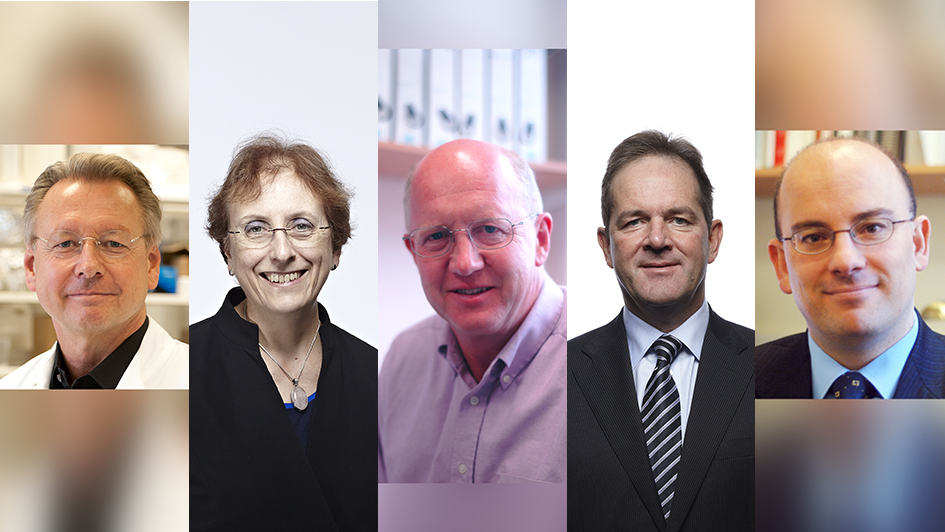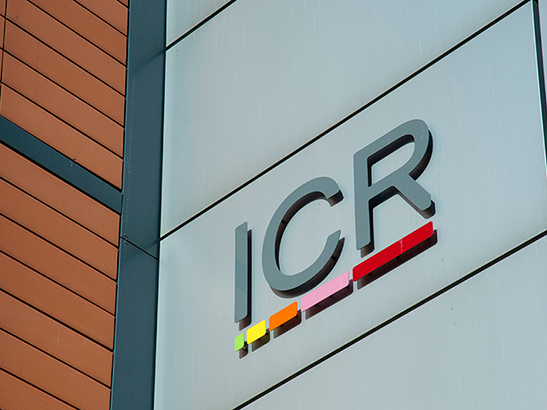
Image left to right: Professor Paul Workman, Professor Ros Eeles, Professor Mitch Dowsett, Professor David Cunningham and Professor Johann de Bono
Researchers at the ICR and The Royal Marsden have been named in a list of the world's most influential researchers.
Professors Johann de Bono, David Cunningham, Mitch Dowsett, Ros Eeles and Paul Workman feature in the latest Highly Cited Researchers list published by science analytics company Clarivate, which uses the number of citations for researchers' academic papers by their peers as a measure of their influence.
Professor Workman is our Chief Executive and works in drug discovery, having led the ICR's Cancer Research UK Cancer Therapeutics Unit to become the most successful academic drug discovery unit in the world.
Professors Eeles and de Bono, both internationally leading figures in their fields, are prostate cancer experts.
Professor de Bono leads major international prostate cancer trials and a research programme underpinning them, as well as being head of the Drug Development Unit at the ICR and The Royal Marsden.
Professor Eeles has led definitive studies in genetic epidemiology, discovering genetic risk factors for prostate cancer and developing new genetic tests that could help detect which men are most at risk of developing high risk disease.
Head of the joint Academic Department of Biochemistry at The Royal Marsden and the ICR, Professor Mitch Dowsett, studies the role of hormones in breast cancer. His work has led to the clinical development of aromatase inhibitors, which are used to treat breast cancer in postmenopausal women.
Professor David Cunningham, Director of Clinical Research at The Royal Marsden and Director of the NIHR Biomedical Research Centre at The Royal Marsden and the ICR, has conducted late phase clinical trials, many of which have determined new standards of treatment and have significantly improved the survival and outcome of patients with gastrointestinal cancers.
The Institute of Cancer Research, London, works in partnership with funders to deliver a number of major research centres and collaborations focused on key strategic priorities.
High quality research
Highly cited researchers are selected for their exceptional research performance, determined by production of multiple highly cited papers that rank in the top 1 % by citations for field and year in Web of Science.
Approximately 6,000 researchers were named Highly Cited Researchers in 2018 — some 4,000 in specific fields and around 2,000 for Cross-Field performance.
Professors Workman and Eeles were listed in the new 'Cross-Field' category of the Highly Cited Researchers list, which recognises researchers who have been influential across several fields in the last 10 years.
Their success reflects the ICR's drive to establish a 'team science' approach to research, with teams of experts from a range of fields working together on the biggest challenges in cancer research.
Global impact of our research
The ICR is the top-ranked academic research centre in the UK's definitive measure of research quality, the Research Excellence Framework (REF), which has judged the ICR as having the most impactful and the greatest concentration of high-quality research of any higher education institution in the UK.
We also rank top or near top in measures of national and international success in innovation and commercial partnership, and have been commended for our knowledge exchange work and our teaching.
Dr Barbara Pittam, Director of Academic Services at the ICR, said: “We're extremely proud that our researchers have been included on this list. It's a strong indication of the world-leading quality and global impact of our research.
“I'm particularly pleased to see the list recognise our strength in, and commitment to, multidisciplinary working across the ICR.”
